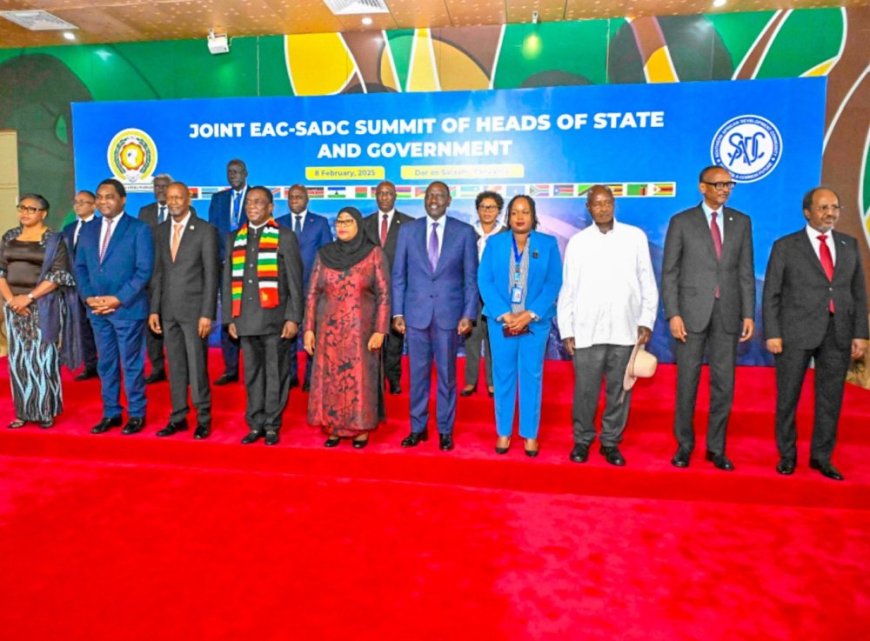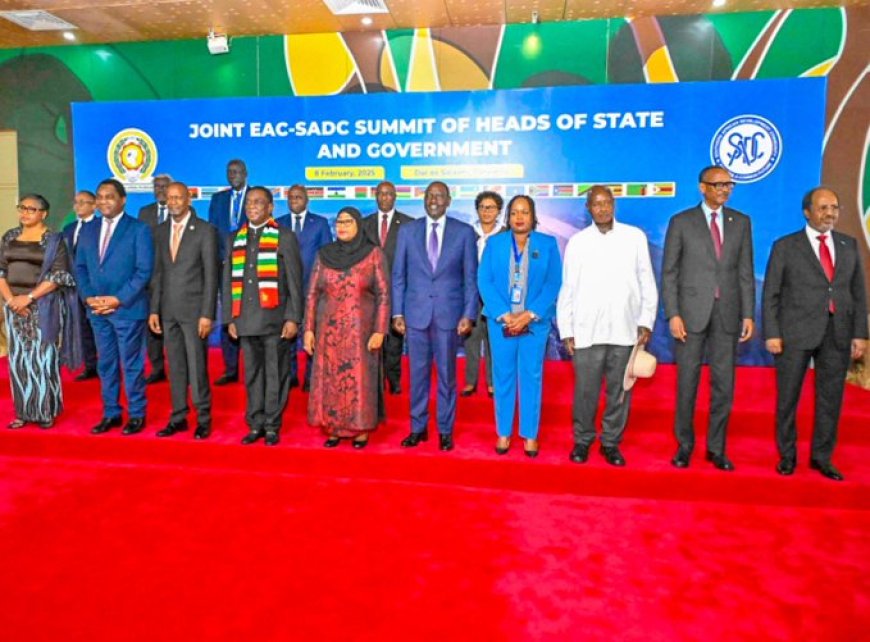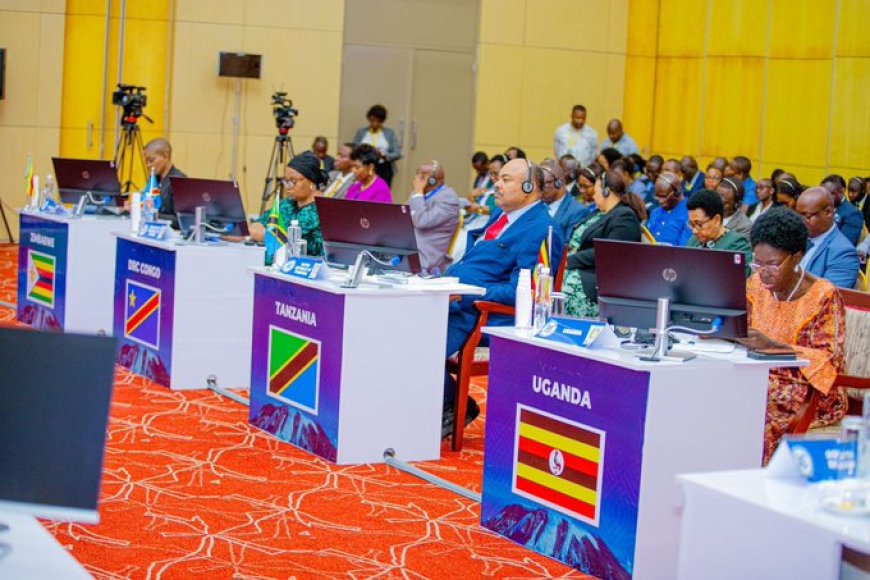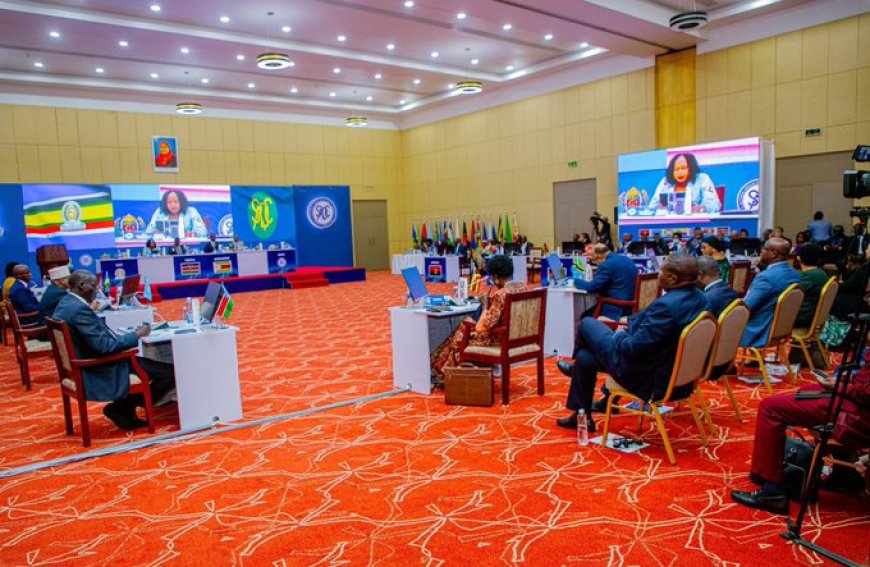Museveni Calls for Direct Talks as EAC-SADC Summit Addresses DRC Conflict
Ugandan President Museveni emphasizes direct dialogue between DRC’s Tshisekedi and armed groups at the EAC-SADC summit. Regional leaders seek solutions to the escalating crisis in eastern Congo.

Dar es Salaam, Tanzania –Ugandan President Yoweri Kaguta Museveni has reiterated the importance of direct dialogue between Democratic Republic of Congo (DRC) President Félix Tshisekedi and armed groups as the most effective solution to the ongoing crisis in eastern DRC. Museveni made the remarks during the joint East African Community (EAC) and Southern African Development Community (SADC) summit held in Tanzania to address the escalating conflict in the region.
The summit, which brought together regional leaders including Rwandan President Paul Kagame, Kenyan President William Ruto, and Tanzanian President Samia Suluhu Hassan, aimed to find sustainable solutions to the protracted crisis. However, President Tshisekedi, who was expected to attend in person, participated virtually, citing logistical challenges.
Museveni’s Call for Direct Dialogue
President Museveni, a key regional mediator, emphasized that direct engagement between President Tshisekedi and the armed groups, including the M23 rebels, is crucial for resolving the conflict. Speaking on social media platform X (formerly Twitter), Museveni stated, “My earlier proposal for this summit was that H.E. Tshisekedi should speak directly to those who conflict with him, as this impacts all of us.” He added that no other forum is better suited to address the issue than the summit.

Museveni’s appeal for dialogue reflects a widespread regional agreement that solely military approaches cannot address eastern DRC's intricate and diverse conflict. His comments emerge amidst rising discontent regarding the stagnant previous peace initiatives and the DRC government's ongoing hesitance to participate in direct talks with the M23.
Ruto Highlights Complexity of the Conflict
During his opening remarks at the summit, Kenyan President William Ruto, who leads the EAC, emphasized the intricate nature of the DRC crisis. He characterized the conflict as “complex, sensitive, protracted, and involving various actors with different interests.” Ruto highlighted that the root issues are embedded in historical, economic, and political factors that extend over decades and transcend national and regional boundaries.
Ruto also highlighted the hidden international dimensions of the conflict, warning that external influences have exacerbated the crisis. “The persistent, cynical, and destructive effects of these external factors must no longer be underestimated or ignored,” he said. Ruto emphasized the need for dialogue, saying, “Such a conflict cannot be solved through military means. We must resist the temptation to believe that we can shoot or bomb our way to a solution in the face of such a complex situation.”

The M23 Factor and Regional Tensions.
The summit occurs in light of heightened tensions in the conflict, notably the M23 rebel group's capture of Goma, the capital of North Kivu province. The M23, which renewed its fighting in 2021, asserts that it is defending Rwandophone and Congolese Tutsi communities from marginalization and persecution. Despite ongoing appeals for dialogue, President Tshisekedi hesitates to negotiate with the group, even as his military experiences ongoing challenges in combat.
The DRC government has charged Rwanda with backing the M23, a claim denied by Rwanda. In turn, Rwanda accuses the DRC of cooperating with the FDLR (Forces Démocratiques de Libération du Rwanda), a militia associated with the 1994 Genocide against the Tutsi. These mutual accusations have heightened tensions between the two countries, hindering regional mediation efforts for the conflict.
Regional Forces in the DRC
The engagement of regional forces, such as Burundian and SADC troops, has increased the situation's complexity. These forces have allied with the Congolese army in combating the M23, but their involvement has attracted criticism and scrutiny. South Africa, specifically, has faced backlash due to its contentious role in the conflict, as its troops have incurred casualties during operations against the rebels.
The DRC government has threatened to invade Rwanda, stoking fears of a wider regional conflict. In this context, the EAC-SADC summit offers a crucial chance for regional leaders to reduce tensions and pursue lasting peace.

The Road Ahead
As the summit concludes, the focus remains on whether regional leaders can bridge their differences and agree on a unified approach to resolving the DRC crisis. Key priorities include:
- Promoting Inclusive Dialogue: Encouraging President Tshisekedi to engage directly with armed groups, including the M23, to address their grievances.
- Strengthening Regional Cooperation: Aligning the efforts of EAC and SADC to ensure a coordinated and effective response to the crisis.
- Addressing Root Causes: Tackling the historical, economic, and political factors that fuel the conflict, including governance reforms and economic development in eastern DRC.
- Mitigating External Influences: Countering the destructive effects of external actors who exploit the conflict for their interests.
Conclusion
The EAC-SADC summit held in Dar es Salaam marks a crucial step in pursuing peace in eastern DRC. Despite the significant challenges, the determination of regional leaders provides a ray of hope. President Museveni rightly emphasized that open dialogue is the most effective way to address the crisis. The summit's success hinges on the commitment of all involved to put aside their differences and collaborate towards a shared objective: enduring peace for the citizens of the Democratic Republic of Congo.
 Kinyarwanda
Kinyarwanda
 English
English










































































